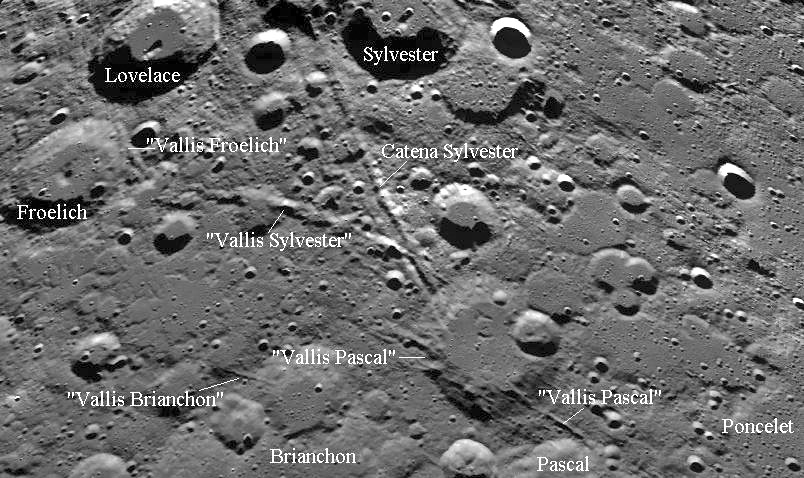Difference between revisions of "July 25, 2018"
(Created page with "__NOTOC__ =Little Known Polar Valleys= Originally published May 9, 2009 <!-- Start of content --> <!-- ws:start:WikiTextHeadingRule:2:<h1> --> <!-- ws:start:WikiTex...") |
|||
| Line 12: | Line 12: | ||
<br /> | <br /> | ||
<strong>Related Links</strong><br /> | <strong>Related Links</strong><br /> | ||
| − | Rükl plate [ | + | Rükl plate [https://the-moon.us/wiki/Rukl+3 3]<br /> |
More little known crater chains in [http://www.lpod.org/?m=200605 this area].<br /> | More little known crater chains in [http://www.lpod.org/?m=200605 this area].<br /> | ||
<br /> | <br /> | ||
Revision as of 18:22, 18 August 2018
Little Known Polar Valleys
Originally published May 9, 2009

Clementine image by Danny Caes, Belgium
When Danny sees features like these crater chains he wonders why they don't all have names. When I see them I wonder which Impact basins are their parents. Only Sylvester Chain has a formal IAU name, so Danny suggests the informal names of Sylvester, Pascal and Brianchon valleys for the other three. Whether they should be called valleys or chains is somewhat tricky. The formally named Sylvester Chain (Catena for Latin speakers) is indeed a chain of closely spaced secondary craters. And the other three, while undoubtedly basin secondaries, look more like gouges, so valley is perhaps a better term. The three valleys are all approximately radial to the Imbrium Basin and thus they probably resulted from the impact of ballistic debris from its formation. Sylvester Chain looks younger than the valleys and is probably from a younger basin, but apparently it is not completely radial to Orientale, the only younger major basin. Going in the other direction - to the backside - the chain is radial to Rozhdestvenskiy, but that seems to be too old to be a source; more likely the younger Plaskett was. The chain very clearly cuts the rim of Poncelet C, as does the Pascal Valley, but the smooth plains in the crater have covered the chain on the crater floor. This has also happened to the crater whose rims were sliced through by the Brianchon Valley. This stratigraphy implies that the chain and valleys are older than the crater fill. If the smooth plains are also Imbrium Basin ejecta - a fluidized rather than coherent component - they must have been emplaced slightly after the the hard stuff smacked down to make the valleys.
Chuck Wood
Related Links
Rükl plate 3
More little known crater chains in this area.
Yesterday's LPOD: A Rille That Doesn't Know What To Do with Itself
Tomorrow's LPOD: Abrasion And Rhino Hide
COMMENTS?
Register, Log in, and join in the comments.



